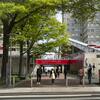What perspective do you feel sensory history brings to public understanding, and how might it change everyday experiences?
Sensory history offers a way of thinking about objects and spaces as active participants in our daily lives. We’re always in some sort of exchange; sensory, financial, emotional, and lots of others. If we acknowledge that our senses are the most fundamental marketplace where those exchanges take place, we can better understand how powerfully things arbitrating value. Objects, really deepen our understanding of what has meaning to us, why it does, and when. For example, gas stations, which are so often overlooked, are spaces filled with sensory cues—sounds, smells, visuals—that influence the form of memories which then act as basis for our future decisions. Therefore, I think sensory history has lots of power and depth to help sharpen our awareness of the things lost when we use terms like “everyday” and “usual.” In that way, sensory history is much more immediate than other forms of history in helping our recognition what experience really is and how it takes form and value.
What do you consider your community at Temple? How has this community impacted you, and how do you hope to impact this community?
My main community at Temple has been the undergraduates I’ve taught. Being party to how they rethink what history can be truly helped me to focus on what history should be. I’m indebted to them for that. There’s always a point during a class when absorption of information changes to critical thinking, but it’s when that shifts to the pursuit of open-ended inquiry is where community really gets made—and lasts. Witnessing students set their own agenda using the materials and tools from the syllabus is when you understand what shape and purpose history should have. It’s bigger than the academy at that point. That sort of energy and hope just doesn’t come from academic publishing and conferences. My faculty and cohort also challenged me to pursue that sort of inquiry and method. They helped me push boundaries even when I was sure where my work might go, and I’m very grateful to them too.
I hope to have impacted my students and colleagues by showing the importance of curiosity and why learning doesn’t always require answers. Appreciating that is what makes education so vibrant and fundamental in showing how we can best develop as people and thinkers. If I helped create an environment of confidence where uncertainty of knowledge is actually a comfortable and exciting position from which to explore—individually and collectively—then I’m content. That was always my aim.
What specific challenges has being in grad school helped you learn to face?
To accept uncertainty and that answers will do their darnedest to appear on their own schedule. Another challenge was realizing that definitive is illusive (and should be). That can be hard to reconcile with the demands of grad school, but it can’t be escaped either. I think that’s why sensory approaches to history made so much sense to me. The ground moves under your feet very quickly when thinking about the ambiguous and complex relationships sensory history and material culture uncover. Answers get lost as quickly as they get found. Fixed truths certainly aren’t real. All of that was really challenging but really liberating too. Again, the undergraduates were a key part of learning the process of communicating ideas clearly while encouraging the embrace of exploration over certainty. Together, these experiences helped me become comfortable with ambiguity and the process and value of open-ended questions in creating knowledge.
What is one piece of advice you’d offer to a potential graduate student?
Don’t periodize. There are many sorts of time and they all happen differently and different speeds. I’d advise future graduate students to think of grad school not as a defined chapter, but as a time of risk which will start a really fascinating journey that will stay with them long after the diploma-in-hand moment. Words, things, sources, everything can play tricks, so don’t expect everything to fit neatly into boxes—embrace the unexpected, and be comfortable with discomfort, as that’s where the most valuable growth happens. If you’re open to that, your work will lead you to places you may not have anticipated, and the learning process will feel exciting and meaningful. And that, of course, won’t and shouldn’t end with grad school.


